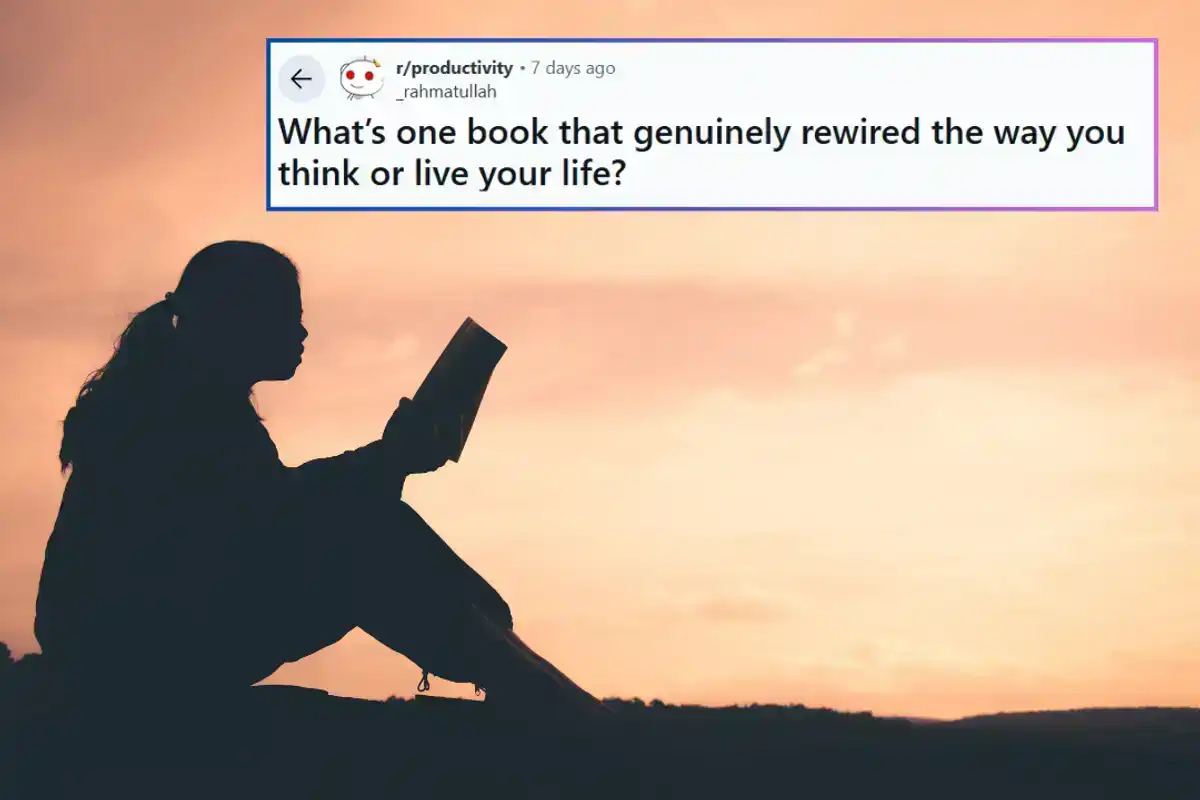A lot of books claim to be life-changing, profound, or inspirational. In reality, many of them go in one ear and out the other. They may be enjoyable, or teach you a few new ideas, but ultimately they're forgotten quickly in the midst of our fast-moving lives. But sometimes, you come across the right book at the exact right time in your life, and the result is something completely unforgettable.
One Reddit user recently had such an experience. On the Subreddit “r/productivity” they wrote: “A few months ago, I stumbled upon a book (I won’t name it here to avoid biasing responses), and it triggered something I can’t fully explain. It didn’t just change how I think—it changed what I notice, how I react, and how I show up in life. Since then, I’ve made it a habit to collect these transformation stories—not summaries, not reviews—but real-life shifts triggered by reading a book. It’s incredible how the right book, read at the right moment, acts like a psychological lever.”
Then, they posed the following question: “I’m asking this out of pure curiosity (and maybe low-key research): Have you ever read a book that changed your internal wiring in any way—your mindset, habits, or how you see the world? … Sometimes, the best books aren’t bestsellers—they’re just the right words hitting us at the right time.”
The comments were flooded with wonderful, life-changing book recommendations, from nonfiction epics about breaking through creative barriers to children’s books that remain on their mind. We’ve collected 14 of the most intriguing, below:
 These books, people say, stuck with them forever. Photo by Matias North on Unsplash
These books, people say, stuck with them forever. Photo by Matias North on Unsplash
1. The War of Art by Steven Pressfield (2002)
One user describes the book: “It’s not super long, and it’s written in this really straightforward, almost no-nonsense way. But it hit hard. The whole idea is about Resistance, that sneaky little force that stops us from doing the stuff we actually care about. It made me realize how often I make excuses without even knowing it. And Pressfield’s take is simple but powerful, just show up, do the work and don’t wait for some magical moment.”
Others were quick to follow, with one person commenting, “The War of Art is the only book I have ever read more than once. Well worth the read” and another said, “Do The Work is a solid follow up to it. It’s short and to the point. Can easily listen to the audiobook in one sitting when you need a boost to GSD (get sh*t done). It’s 90 min.”
- YouTube www.youtube.com
2. The 7 Habits of Highly Effective People by Stephen R. Covey (1989)
One of the great self-help books from the late 1980s was recommended by multiple people.
One commented, “If I wanted to suggest the ONE book anyone to read in their lifetime, it is it. The idea is simple—be proactive, live by your values, and focus on what’s in your control. It will change the way you think and approach life.”
Another agreed, writing, “7 Habits also changed my life years ago by making my interpersonal relationships better, even though it doesn’t talk much about it. The book just motivated me to be my authentic self, increase my self-worth, and hence improved my relationship with others as a side effect. I had also read how to win friends and influence people at that similar period, but that book didn’t add any value as much as 7 Habits did.”
3. If the World Were a Village by David J. Smith (2002)
The first children’s book to grace the chat is a best-selling thought experiment that imagines the world’s 6.8 billion population as a village of just 100 people. One person describes it as a “short picture book, but [one that] completely changed how I see the life, world.”
They continue, “I was shocked how fortunate I was compared to all other people who do not even have basic food and water, and at the time, I was so ashamed that I took it for granted. Since then, I’ve traveled around the world, trying to interact with local people, and I try to learn about the history and the reality of these locations. (And I learned English to communicate.) I would not be who I am today without that book.”
4. The Anatomy of Anxiety by Ellen Vora (2022)
Acclaimed psychiatrist Dr. Ellen Vora’s nonfiction book helps readers understand how anxiety manifests itself in the body and mind as a fear mechanism—and walks them through steps they can take to overcome it.
“Before reading this book, I’d been focusing lopsidedly on the spiritual side and suffering from years of anxiety problems and panic attacks,” writes one Reddit user. “This book is a turning point for me, enabling me to view the mechanism of anxiety in the body more objectively.”
5. Flowers for Algernon by Daniel Keyes (1966)
First published as a short story in the April 1959 issue of The Magazine of Fantasy & Science Fiction (which won the Hugo Award for Best Short Story the following year), Flowers for Algernon is a powerful novel about the treatment of people who are mentally challenged. It explores the complicated relationship between intellect, emotion, and happiness.
One person commented that the novel “really made me think about how we all judge and treat other people, especially how we as humans look down on other people in different, subtle ways. It actually made me sick in a way I’ll never forget” and “completely changed my view on how we treat ‘stupid’ people. It’s so profound, because it’s such a short text, but it just hits you like a bullet train. I never cried so much after reading a book before.”
6. Zen and the Art of Motorcycle Maintenance by Robert M. Pirsig (1947)
Pirsig narrates a summer motorcycle trip undertaken by a father and his son, which slowly morphs into a man’s search for meaning.
“I can’t fully describe the feeling. Part of my love was his concept of ‘quality’ and it almost becomes religion-like,” commented one person. “It’s been probably 25 years since I read it. I should read it again.”
 People insist you can read and re-read 'Zen and the Art of Motorcycle Maintenance' for ages. Photo by Glen Alejandro on Unsplash
People insist you can read and re-read 'Zen and the Art of Motorcycle Maintenance' for ages. Photo by Glen Alejandro on Unsplash
7. Ishmael by David Quinn (1992)
“The metaphor about society being a faulty plane that is falling off a cliff but thinks it’s flying simply because it hasn’t hit the ground yet has always stuck with me,” wrote one Reddit user of the philosophical novel.
Framed as a Socratic conversation between two characters, author David Quinn explores the ways modern human supremacy causes irreparable damage to the environment.
Another user echoed their praise, writing: “I read a ton of self-help, and all the ones mentioned in this thread I have rolled my eyes at because they reiterate common thought trends with an occasional light bulb moment. Not to say they aren’t helpful, just not necessarily 'change my life' kind of books. Ishmael made me THINK and put life in perspective. It was the book that changed my conservative thinking to a very much empathy based way of living with intention.”
8. Meditations by Marcus Aurelius (161-180)
The Roman Emperor’s series of personal writings resounded with readers, with one who commented, “Some of the best thoughts on how to live and grow, and how to deal with adversity, mortality, and impermanence. Dude was pretty in touch with the universal human condition for an Emperor.”
Another person replied, “I think I really need to give a copy of this to my brother… It really helped me out, and I think I see him struggling with things that could be easier for him with some tools he could gain from this.”
- YouTube www.youtube.com
9. Radical Acceptance by Tara Brach (2004)
Reddit users are not the only ones who loved this book about embracing life through the heart of a Buddha; beloved Buddhist Thich Nhat Hanh wrote, “Radical Acceptance offers us an invitation to embrace ourselves with all our pain, fear, and anxieties, and to step lightly yet firmly on the path of understanding and compassion.”
Similarly, people on the thread sung its praises, writing, “Her RAIN method has literally saved my life and changed my perspective on how I interact with the world and how I treat myself. Thanks to her, I’m heading into a new chapter where trauma doesn’t rule my life,” and “This book helped me tremendously while navigating hard personal situations, including terminal disease in my family.”
10. The Power of Your Subconscious Mind by Joseph Murphy (1963)
One person found this book, which posits our subconscious dictates life events, to be tremendously powerful.
“I’m a pragmatic person and would question this book would it be introduced to me now instead of when my mind was more open,” they begin. “Maybe it works because it makes you believe that all it takes is a wish and some work… I read it when I was about 15 and have had many things I wished for happen.”
11. Siddhartha by Herman Hesse (1922)
Hesse’s ninth novel follows the spiritual journey of a man during the time of the Gautama Buddha. Originally published in 1922, it was later published in the United States in 1951.
One user writes, “We sometimes find ourselves most lost when we stop believing other people are going to be able to give us the mentorship we need. Often, literature can teach what straightforward non-fiction texts can’t.”
12. Love Yourself Like Your Life Depends on It by Kamal Ravikant (2020)
For a user on the thread, Ravikant’s inspirational self-healing book “brought home how essential self-love is, and that it isn’t indulgent or narcissistic. It’s the foundation that makes everything else possible.”
- YouTube www.youtube.com
13. The Little Prince by Antoine de Saint-Exupéry (1943)
One of the best-selling books of all time, The Little Prince comments on life, adults, and human nature.
In particular, one part of the novel stood out for this Redditor: “The part in The Little Prince where the adult looks at his drawing and thinks it’s a top hat and the kid says ‘no, it’s a picture of a snake that just ate an elephant’ really helped little kid me understand how people can see the same things so differently. It seems small now, but as a little kid it’s hard to understand why adults ‘don’t get it’ when it seems obvious to kids. That helped me have patience for my parents/adults, and I think I carried it with me as a beginner builder of compassion for people in general.”
14. Get It Done by Aylet Fishbach (2022)
The final book recommendation came from a user’s friend. For them, psychologist and behavioral scientist Aylet Fishbach’s book “changed the way I think about how I manage my time and myself. I rarely think of ‘recovery’ and ‘productivity’ in the same sentence, and generally think in terms of opportunity costs or how to best use my time.”
15. The 12 Week Year by Brian P. Moran and Michael Lennington (2013)
The 12 Week Year offers an organizational system that combats the trouble people have sticking to New Years resolutions and other annual goals. The workbook breaks a year down into multiple 12-week chunks and helps encourage ugency in both goal-setting and how people approach those goals.
One commenter wrote, "It completely changed how I view time. A year is too long to stay focused, but 12 weeks? That’s war mode. It forces action and kills procrastination. It made me realize how much time I was wasting 'planning' instead of executing."
This article originally appeared last year. It has been updated.




 A
A 
 A young girl holding her hand out saying "stop."
A young girl holding her hand out saying "stop." Mom and daughter.
Mom and daughter.


 These books, people say, stuck with them forever. Photo by
These books, people say, stuck with them forever. Photo by  People insist you can read and re-read 'Zen and the Art of Motorcycle Maintenance' for ages. Photo by
People insist you can read and re-read 'Zen and the Art of Motorcycle Maintenance' for ages. Photo by